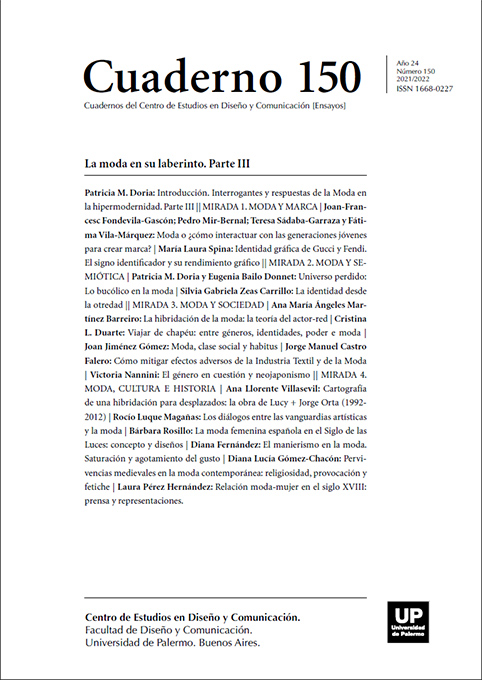Cartografía de una hibridación para desplazados: la obra de Lucy + Jorge Orta (1992-2012)
Résumé
Este artículo tiene como objetivo evaluar el acercamiento al diseño indumentario por parte del tándem artístico formado por Lucy y Jorge Orta para el desarrollo de prototipos de refugios portables que nacieron hace treinta años con el fin de cubrir necesidades de refugio en situaciones de indigencia y migración. Se revisará la base operativa y funcional de una obra que se desarrolló en paralelo a un ambiente de reflexión y actuación que, gracias a creadores como Tess Giberson, Vexed Generation o Hussein Chalayan, transitaba por la esfera del arte, la moda y la arquitectura por medio de diferentes parámetros de actuación.
Références
Bourriaud, N. (2003). Nicolas Bourriaud in correspondence with Lucy Orta. En R. Pinto, N. Bourriaud, L. Orta, & M. Damianovic. Lucy Orta. Nueva York: Phaidon.
Eco, U. (2011). La estructura ausente. Introducción a la semiótica (Francisco Serra Cantarell, trad.). Buenos Aires: Debolsillo.
Feuerstein, G. (1988). Visionäre Architektur. Frankfurt: Wissenschaften
Howard, J. y Spice, J. (1989). Plastic sheeting: its use for emergency housing and other purposes. Oxford: Oxfam.
Johung, J. (2013). Replaceable Skins: Clothing and Mobile Home. En J. Johung & A. Sen (eds.). Landscapes of Mobility: Culture, Politics, and Placemaking . Wisconsin: Routledge.
Kerblat, B. (c. 1985). UNHCR United Nations High Commissioner for Refugees. UNHCR Plastic Sheeting (Entrevistador anónimo) [Archivo de Audio]. Recuperado de https://www.moma.org/multimedia/audio/20/501
Kloos, M. (2010). Fashion & Architecture, guía de exposición. Amsterdam: ARCAM.
Koda, H. (2003). Fashioning Thoughts. En J. S. Major y Y. Teng (Eds.). Yeohlee: Work. Material architecture. Melbourne: The Image Publishing Group.
Martin, R. (1998). Energetics: Clothes & Enclosures. Berlin: Aedes Galerie für Architektur und Raum.
Martín, I. (2012). Trajes espaciales. La vestimenta como proyecto arquitectónico [Tesis doctoral, Universidad Politécnica de Madrid]. Repositorio UPM. oai:oa.upm.es:14913
Office for the Coordination of Humanitarian Affairs [OCHA] (2004). Tents. A guide to the use and logistics of family tents in humanitarian relief. United Nations Publication. Recuperado 11 de noviembre 2019, de https://www.sheltercluster.org/sites/default/files/docs/Guide%20to%20the%20Use%20and%20Logistics%20of%20Family%20Tents.pdf
Orta, L. y Restany, P. (1998). Lucy Orta: Process of transformation. Paris: Jean-Michel Place.
Orta, L. (2003a). Interview with Andrew Bolton (extract). En R. Pinto, N. Bourriaud, L. Orta, & M. Damianovic. Lucy Orta. Nueva York: Phaidon
Orta, L. (2003b). Interview with Paul Virilio, 1995 (David Wharry, trad.). En R. Pinto, N. Bourriaud, L. Orta, & M. Damianovic. Lucy Orta. Nueva York: Phaidon
Pinto, R. (2003). Collective Intelligence: the Work of Lucy Orta. En R. Pinto, N. Bourriaud, L. Orta, & M. Damianovic. Lucy Orta. Nueva York: Phaidon
Quinn, B. (2003). Intimate Distances: Space, Society, Humanity and Hope – The Work of Lucy Orta. En C. Smith y L. Orta (eds.). Lucy Orta: Body Architecture. Silke Schreiber Verlag. Nueva York: Bloomsbury.
Quinn, B. (2002). Techno Fashion. Nueva York: Bloomsbury. Studio Orta. (27 marzo, 2013). Lucy + Jorge Orta: Fabulae Romanae [Archivo de video]. Recuperado de https://www.youtube.com/watch?time_continue=1589&v=SEATB_NBBx4&feature=emb_logo The Mad Housers Inc. (s.f.). The Mad Housers [Blog]. Recuperado 10 de diciembre 2019, de http://madhousers.org
UN-Habitat (2017, 4 de julio). UN-Habitat joins forces with partners to address living housing needs of refugees, migrants. Recuperado 10 de noviembre 2019, de https://unhabitat.org/un-habitat-joins-forces-with-partners-to-address-living-housing-needs-of-refugees-migrants
Vyzovity, S. (2003). Folding Architecture: Spatial, Structural and Organizational Diagrams. Amsterdam: BIS Publishers.
Vyzovity, S. (2012). Pleat and Play. En Maria Vogiatzaki y Konstantinos-Viktor Spyridonidis (Eds.). Rethinking the Human in Technology Driven Architecture ENHSA-EAAE No55 - Proceedings of the International Conference on Rethinking the Human in Technology Driven Architecture. ENHSA and the European Association for Architectural Education. Amsterdam: BIS Publishers.
Los autores/as que publiquen en esta revista ceden los derechos de autor y de publicación a "Cuadernos del Centro de Estudios de Diseño y Comunicación", Aceptando el registro de su trabajo bajo una licencia de atribución de Creative Commons, que permite a terceros utilizar lo publicado siempre que de el crédito pertinente a los autores y a esta revista.


